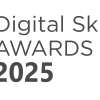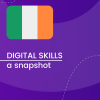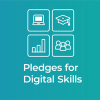Digital education and inclusion: the SAID project
The Erasmus+ project SAID (School Assistance – Inclusive & Digital School Assistance for Digital Education) aims to promote the digital skills of people with disabilities and learning difficulties. It is run by the association atempo and carried out in cooperation with the University of Graz, the St. John of God Community Service Ireland and TRYcamps Language School Ltd Finland.
The Project
Since 2018, atempo has been training people with disabilities and learning difficulties as school assistants in digital education (DigiCoaches) as part of the SAID project. Initially, the DigiCoaches worked together with students and teachers in workshops. The association cooperated with partners from various European countries. After these workshops, the DigiCoaches were permanently employed at five primary schools in Graz (Austria). The DigiCoaches support the students in the acquisition of digital skills, which are part of the Austrian curriculum for elementary schools.
The experience and knowledge gained from this pilot project in Graz will now be used in the SAID project to develop curricula, training materials and manuals that will serve as a basis for the training of DigiCoaches. These will then be used in the partner countries of the SAID project – i.e. Austria, Finland and Ireland. The aim is to promote cooperation with the DigiCoaches and to improve digital education for people with disabilities. The project will run from 1 June 2022 to 30 November 2024.
Aim of the project
The SAID project pursues two main objectives: Firstly, to make use of the experience of the DigiCoaches, who are already active in a pilot project in Graz: the conditions for their use in Austria, Finland and Ireland are to be investigated. Secondly, the project team will develop a curriculum, training materials and manuals for schools to enable successful cooperation with the DigiCoaches. People with disabilities as well as school principals, teachers and students are actively involved in the development of the curriculum.
Phases
The project is divided into several phases: analysis, development, testing, implementation, evaluation and adaptation, as well as the publication of the results.
During the analysis phase, experience was gained from the work of the DigiCoaches of the pilot project in Graz. The analysis report was published in April 2023.
The next step will be the development of a curriculum for the professional field of "School Assistant for Digital Education and General Didactic Principles". This is created for four different modules:
- Training Module 1: Basic Digital Skills
- Training Module 2: Media Literacy
- Training Module 3: SAID Toolbox
- Training Module 4: Social and Communication Skills
This is followed by the test phase of the four modules as well as their implementation, evaluation and adaptation. The aim is to create a handbook for schools with guidelines for implementation. Finally, the results will be published.
What makes SAID a good practice?
The SAID project stands out as a good practice as it specifically promotes the digital skills of people with disabilities and learning difficulties. By training DigiCoaches, the project makes a significant contribution to digital inclusion. Close cooperation with stakeholders and transnational cooperation enables the exchange of best practices and the dissemination of innovative approaches.
The project aims to create an inclusive society where everyone has the chance to expand their digital skills and reap the benefits of digital education. These achievements were also recognized by the Lebenshilfe Inclusion Award in November 2023. In addition, SAID received a nomination for the Bank Austria Social Award 2023 and achieved second place – further recognition for its commitment to inclusion and digital education.






